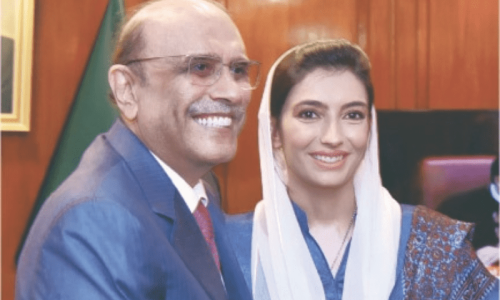On a cool mid-December night, Karachiites had flocked at a popular recreational spot along the waterfront to watch the screening of the last episode of the Turkish soap Ishq-e-Memnu.
Initially, mainstream entertainment channels and TV production houses did not pay heed to the rising popularity of the soap, touting it as a temporary fad. But when they began to observe the ascending rating of Ishq-e-Memnu, even overtaking last year’s biggest hit TV serial Humsafar, they finally sat up and took notice.
Express Entertainment went to the extent of shelving an ongoing serial and replacing it with an Urdu-dubbed Turkish drama. “After airing eight episodes of my serial Do Naina that I penned for Gold Bridge productions, it was stopped and replaced by a Turkish play,” says Samina Ejaz, the screenplay writer of Do Naina.
Other mainstream entertainment channels have also offered to air dubbed Turkish soaps; Geo has decided to air dubbed Turkish soap Noor on its prime-time slot twice a week.
Babar Javed of A and B productions is appalled by these developments. “What is upsetting is that our dramas are being shifted from prime-time slots to non-prime-time ones. Our industry was growing in terms of quality, employment opportunities and technical competence. Now is the time to support us rather than bring in direct competition that may take down the drama industry from which we may never recover,” he says.
Humayun Saeed of Six Sigma Entertainment says, “If channels want to show foreign content then by all means they should show it but by subtitling it in the national language. When Star Plus serials appeared on our TV screens viewership base shifted and some came back because we raised the quality of our dramas. However, Star Plus serials continue to be shown albeit illegally on cable channels and it has never been completely eliminated.”
Farhan Shehzad, marketing director of Express Network, explains his channel’s perspective for showing Turkish plays. “One must understand that for upcoming entertainment channel like ours we have to compete with the big players in the market. Urdu1 would keep repeating Ishq-e-Memnu throughout the day and this led to an increase in their ratings.
One must understand that the channel’s revenue comes from commercial advertising that is strictly linked to ratings. We held back the drama Do Naina because it was a tactical move on our part. If we wanted to we could have taken off our other local content but because they are getting good ratings and generating advertising revenue hence we did not remove these plays.” Besides revenue matters, quality of storylines is another contentious issue between channels and production houses. The channels argue that the content quality provided to them is substandard hence they are looking around for foreign content whereas production companies claim that their product is by no means inferior and is at par with international standards. “The viewers gave their judgment when Ishq-e-Memnu got the highest ratings.
They have rejected the monotony of themes and actors that was being show in the local content. Also production houses think we will take whatever they provide us because we had no other choice,” says Iqbal Ansari, PTV veteran and now director special projects at a private TV channel.
“I can give you names of several sitcoms and serials that have been massively successful which indicates the superior quality of our product. For instance my sitcom Kis Din Mera Vyah Hoga has been repeated three times,” says Javed. As far as protectionism for the industry is concerned that is being demanded by the drama industry, Faraz Ansari, the CEO of Urdu1 says, “Protectionism did nothing for our film industry as it didn’t stretch its creative boundaries.”
Hum Network has so far resisted the temptation to air Turkish soaps stating that their plays are receiving above average ratings and hence have no plans to succumb to the temptation. “Not only are we getting good ratings for our dramas but we are also dubbing our plays in other languages and exporting them,” says Athar Viqar Azeem, senior Vice President, Hum Network.
According to industry insiders, the drama fraternity is needlessly panicking and this phenomenon will last merely for six more months at the most and viewers will revert to Pakistani dramas.














































